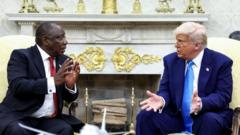Rob Hoatson, the organizer of a white crosses memorial for murdered farmers in South Africa, clarifies that Donald Trump incorrectly referred to it as a burial site during a White House meeting. While emphasizing the violence faced by farmers, he contends that the memorial serves to honor victims rather than signify widespread systematic killings.
Trump Misrepresents White Crosses Display, Local Organizer Clarifies

Trump Misrepresents White Crosses Display, Local Organizer Clarifies
The individual behind the white crosses display in South Africa asserts that it was a temporary memorial, not a burial site, after Trump mischaracterized it during a meeting with President Ramaphosa.
The man who organized a striking display of white crosses in KwaZulu-Natal, South Africa, has responded to claims made by former US President Donald Trump, stating that the crosses were misrepresented as a burial site during a recent White House meeting. Rob Hoatson clarified that the crosses served as a temporary memorial dedicated to the memory of Glen and Vida Rafferty, a couple murdered on their farm in 2020.
During the tense meeting, Trump showcased a video of the crosses to emphasize his belief that white farmers were facing systematic violence in South Africa. He described the crosses as "burial sites" for over a thousand white farmers, asserting that cars around the memorial were there to pay respects to family members. In contrast, Hoatson explained, "It's not a burial site, but it was a memorial. It was not a permanent memorial that was erected."
While Trump acknowledged there was violence in South Africa, he claimed the systematic targeting of white farmers was significant. Hoatson noted that Trump's propensity for exaggeration led him to set the record straight, stating that the crosses were erected to honor the Raffertys, who were killed in 2020, and had later been removed.
Moreover, Hoatson articulated that the core issue extends beyond the characterization of the memorial, emphasizing that the murders of white farmers were "unacceptable" and "unnecessary." When discussing Trump's confrontational approach toward Ramaphosa, he remarked that the South African leader's response to Trump was inadequate, suggesting a disconnect between the leaders regarding the gravity of the situation.
In reaction to the meeting, Ramaphosa acknowledged the presence of crime in South Africa but pointed out that the victims of such crime are not exclusively white, highlighting that the majority of murder victims tend to be black individuals. Although the exact racial breakdown of crime statistics remains unclear in South Africa, recent data indicated approximately 10,000 murders in the country, with a small fraction related to farm attacks.
The controversial meeting has sparked a mixed array of reactions in South Africa, with some Afrikaner activists finding solace in Trump's comments, feeling it brought international attention to the struggles faced by white farmers. However, political commentator Pieter du Toit asserted that the incident reflects a pattern of "exaggeration and misinformation" within certain activist circles, affecting perceptions of farm violence in South Africa.
This episode underlines the complexities surrounding racial dynamics, crime, and the political response in South Africa, revealing how narratives can diverge dramatically across different platforms and audiences.




















